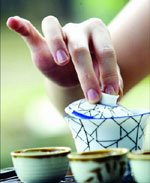Is tea fermented or oxidized? In fact, teas don't undergo any fermentation at all. The tea leaves are actually bruised a little, and it causes the tea leaves to undergo a chemical change when exposed to air - they get oxidized. This results in the leaves turning into a darker color. And it changes the color and taste of the tea. Then, by controlling the amount of fermentation, you can end up with totally different results from the various varietals of tea.
Take Tieguanyin, for example. Theoretically, you could produce an unfermented (or unoxidized) green Tieguanyin. Or you could oxidize it a bit, and end up with these lightly-fermented Tieguanyins that are common today. Or, you could heavily oxidize the leaves, and end up with a heavy fermented Tieguanyin. You could even go further and produce a fully fermented Tieguanyin - a red Tieguanyin.
So teas are oxidized, and not actually fermented like beer or wine. Some people ask, "Why is said to be fermented when it's actually oxidized?" It seems fermentation is a direct translation from Chinese when it comes to tea. Over a century ago, "fermented tea" became all the rage, replacing green tea as the favorite among Westerners. But all Chinese tea texts - past and present, even scientific ones always use the word faxiao (chinese character) which means fermentation. So in China everyone, tea experts, tea merchants, tea artists, tea masters all say faxiao or fermented, not yanghua (chinese characters) - oxidized. They always refer to their teas as fermented, not oxidized.
And why is that? Faxiao, or ferment is a word that we are familiar with. It's a food word, it's a good word. When we say oxidize, it sounds like a scientific word, an unfriendly word. Ferment. Oxidize. Which one sounds better? Now think of food. Say the words again. Ferment. Oxidize. Which word would you rather associate with your food?
Keep in mind, China has a very long history of wine culture; as old or even older than tea. So maybe faxiao, ferment is a word they are more intimately conscious of.
When I was in high school, I was into tea. But when I read that teas were "fermented" it worried me a little. Was I going to get drunk from my tea? Is my tea tainted with alcohol? I always made a personal choice to stay away from alcohol, because back then we heard stories of fellow students who died drinking. They got drunk, passed out, and froze in the winter cold. I didn't want to die young, and I didn't want alcohol to dumb up my brain. So I never drank. And that's why it worried me when I read that tea was "fermented". But fermented or not, I still had to drink it. Tea is just too good. But this fermentation thing still worried me enough that I had to immediately understand the process of fermentation. And after understanding it, I concluded that tea was not fermented. Instead it must undergo some other change that is not fermentation, I thought. Then I thought of tree leaves and how they could change from green to brown under certain circumstances. Tea leaves must change or ferment under similar circumstances. So then I could drink tea worry-free.
Maybe when we speak of fermentation it can confuse people, like I was. But fermentation, as opposed to oxidation is more of a people-friendly word. It's a word we associate with food. And it's a word that's most understandable to people. Just remember to make the distinction that fermented tea is not like fermented wine. There is no alcohol being produced here. Rather it's a chemical change, just as real fermentation is, that makes a dramatic change in the end product - just as grapes can change into wine.
Tea fermentation. Wine fermentation. They're two totally different subjects. But both have to do with food. I can accept the word "fermentation" when associated to tea.
So when we refer to tea do we say fermented or oxidized? I prefer the word fermented. And it's what everyone in China is saying anyway.
Immortal's Palm Tea
-
by STEVEN D. OWYOUNG
AUTHOR'S NOTE: *This essay is dedicated to Frank Hadley Murphy, author of
The Spirit of Tea, for his kind introduction to the poet Li B...
14 years ago


No comments:
Post a Comment